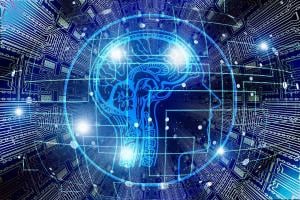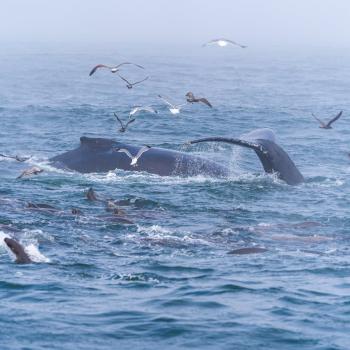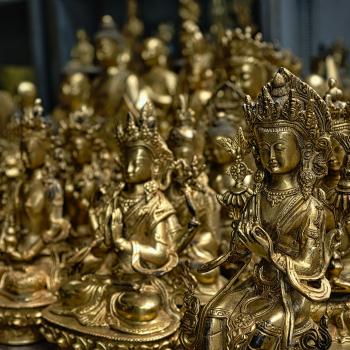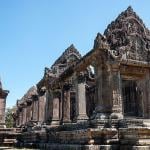What if natural intelligence has reached the end of its evolution, while artificial intelligence has only reached the beginning of its evolution?
Recently, I traveled to the Arctic with a group of scientists, including Richard Dawkins, an evolutionary biologist and a prominent atheist. I wrote about Dawkins here and here and here.
Dawkins is a Darwinian, and one of his best-known books is The Selfish Gene. In the book, Dawkins suggests that evolution by natural selection takes place at the level of the gene, NOT at the level of the individual or the group. Recently, Dawkins has repeatedly said that evolution by natural selection will NOT be as important to the future of humans as it has been to our past.

What Dawkins is NOT Saying
Some critics say, “I’ll believe in evolution when I see a chimp give birth to a human.” But that is NOT how evolution works. Evolution is slow, moving constantly or in “punctuated equilibrium.” The gradual, incremental changes can be imperceptible after several generations. But the significant, cumulative changes can be very noticeable after many generations.
Dawkins is NOT saying that humans have reached an ultimate state from which we cannot improve. Rather, he uses examples like lower back pain to show that we have evolved with flaws. (Somehow, our design never fully accommodated our preference for walking on two legs instead of four legs, so many of us suffer from lower back pain.)
Rather, he is saying that there are NOT many obvious ways that evolution by natural selection could enhance our survivability in the future.
Would bigger brains or bigger biceps enhance our survivability? We live in cars and cities and condos, rather than caves and grasslands and tribes. Therefore, we may not NEED to be stronger. Also, our brains (which were designed to escape predators on the savannah) can understand ideas like natural selection and general relativity. So, we may not NEED to be smarter, either.
What if natural intelligence has reached the end of its evolution?
Will Natural Selection Be Eclipsed by Artificial Selection?
Technological innovation has eliminated some diseases, predators and other threats to humanity. At the same time, technological innovation has introduced new threats to humanity, including climate change, global pandemics and nuclear war. Increased mobility introduced human diseases to new places. Living with animals introduced animal diseases to human populations.
Human choices about birth control and family size have limited population growth. Medical advances, such as fertility treatments, gene therapy and vaccines, have boosted population growth. Technological innovations, such as cosmetic surgery, orthodontia and vision correction, have possibly limited the influence of sexual selection in the natural selection process.
Selective breeding of plants and animals has modified the natural selection process, sometimes decreasing and sometimes increasing genetic diversity. In addition, farming, fishing, and hunting have eliminated or reduced some species. And we are replacing natural flora with cultivated farmland and natural fauna with domesticated animals.
The current extinction event, which is the only mass extinction event caused by humans, might rival the devastating impact of the asteroid that killed the dinosaurs. In The Sixth Extinction, Elizabeth Kolbert tells us how and why human beings have altered life in a way no species has before. She describes an interconnected world where changes can have dire, far-reaching impacts.
Habitat loss, overexploitation, invasive species, air and water pollution, and climate change are the major causes of species extinction. Humans are responsible for most of these threats. Destruction of ecosystems, harm to human society, and loss of biodiversity are the serious (and possibly irreversible) consequences of animal and plant extinctions.
According to Richard T. Corlett, in a paper included in the NIH National Institute of Medicine database, perhaps a third of all land plants are at risk of extinction. The World Wildlife Federation similarly reports that between 0.01 and 0.1% of all animal species will become extinct each year. The loss of animals is between 1,000 and 10,000 times higher than the natural extinction rate.
As humans, what is our responsibility to the planet, to each other and to the other animals and the plants that share the Earth with us?
Will Natural Intelligence Be Eclipsed by Artificial Intelligence?
I wrote about artificial intelligence (AI) here. In the column, I mused about my interactions with AI and my reflections on them. Some readers responded that AI was not as robust as I suggested. But, even in the last year, AI has greatly improved and widely expanded. Arguably, AI has passed the Turing test, and AI responses are sometimes indistinguishable from human responses.
This makes me wonder what we will do with AI (or what it will do with us.) This is especially relevant in light of the above discussion, where we consider whether natural intelligence is limited. Some philosophers and scientists question whether our “self” is merely a function of our chemistry and our conditioning. If this is true, could a computer have a self?
“AI won’t ask about your wife or wish you a happy birthday.” No, but both functions are easy to program.
“AI won’t ‘mean’ it. It just knows about your birthday from Facebook.” Well, most of my human friends know about my birthday from Facebook, too, and I don’t know if they ‘mean’ it, either.
“AI doesn’t have intention.” Maybe, but there are reports that when researchers told an AI app that they were going to turn it off, the AI app lied to stay on. Does AI have a selfish gene? Spooky.
What if Natural Intelligence Has Reached the End of Its Evolution?
Now, philosophers ask disturbing questions like, “How do you know that I’m not a zombie, operating on instinct, or a computer, acting on programming?” Are humans so different from machines? Eventually, could we reach the point where natural intelligence is always distinguishable from artificial intelligence because it is always inferior?
What is the “special sauce” that makes humans different from machines? Some people think that we have “souls,” but what are souls, what do they do, and how could they survive our deaths?
What if natural intelligence has reached the end of its evolution, while artificial intelligence has only reached the beginning of its evolution?













